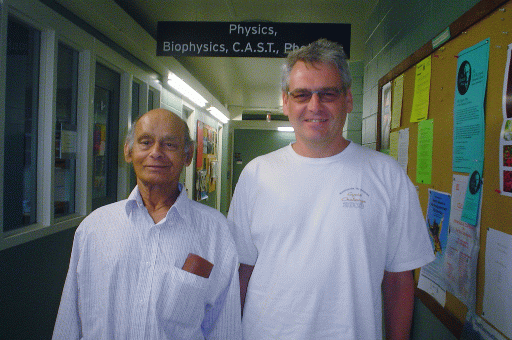|
Gernot Heiser
B.Sc. 1982 (Freiburg), M.Sc. 1984, Ph.D. 1991 (ETH-Zurich)
 Gernot Heiser completed his M.Sc. in Semiconductor Physics and Computer Science from Brock University in 1984.
He went on to complete his Ph.D. in Computer Engineering at the ETH-Zurich, and moved to the University of
New South Wales in Australia, where he is currently a John Lions Professor of Operating Systems. He is also
the Founder, Director, and Chief Technology Officer of the Open Kernel
Labs, responsible for the
operating system software in millions of hand-held devices around the world.
Gernot Heiser completed his M.Sc. in Semiconductor Physics and Computer Science from Brock University in 1984.
He went on to complete his Ph.D. in Computer Engineering at the ETH-Zurich, and moved to the University of
New South Wales in Australia, where he is currently a John Lions Professor of Operating Systems. He is also
the Founder, Director, and Chief Technology Officer of the Open Kernel
Labs, responsible for the
operating system software in millions of hand-held devices around the world.
In June, 2010, Prof. Heiser visited Brock campus and caught up with his M.Sc. supervisor,
Prof. Emeritus Ramesh Shukla.
My MSc at Brock (under the guidance of Prof Ramesh Shukla) had involved building a simulator for molecular-dynamics modelling of crystalline solids. However, I had for years been increasingly excited by computing (and my first year at Brock, before my MSc, I had actually spent as a computer science student). So after my MSc I was looking for a good opportunity to do a PhD in CS.
I ended up as a PhD student in the CS department of ETH Zurich, one of the worlds top technical universities. I actually came back to Brock during the summer of '86 to do some more research with Ramesh.
Unfortunately, I twice lost my PhD advisor (pretty careless, I know) and ended up in a lab that was part of EE, with Prof Wolfgang Fichtner as my advisor. In the end what I did for my PhD wasn't all that different from my MSc: I again built a simulator, this time for 3-d modelling of silicon devices (i.e. transistors). That simulator was used by a number of companies, including Motorola, for a few years (until replaced by a more advanced program written by later students in the same lab).
After completing my PhD I went to Sydney, Australia, as a faculty member in the Computer Science & Engineering Dept (they call it "school") of the University of New South Wales (UNSW). UNSW, like ETH, is a very reseaarch-focused university, and its CS dept is the best in the country. (I didn't actually know that, I guess I was lucky.) The Australian university system is modelled after the British system, and my original title was "lecturer" (which is the same as assistant professor).
For a number of years I used my silicon modelling know-how to work with UNSW's solar cell research centre (the leading such lab in the world) to help them understand and optimise the operation of their solar cells. This contributed to an efficiency world record in the mid-90s.
In parallel I was expanding my CS creds and from the mid-90s built a group focussing on operating-systems (OS) research. We started building OSes, including some of the world's best-performing microkernels. The group grew and at one time I had 13 PhD students. In 2002 I became a full professor.
Towards the end of '02 the Australian Government created a national Centre of Excellence for ICT research called NICTA. I was put in charge of research in operating systems for embedded systems. We did some cool and fun stuff, and our microkernel OS ended up being adopted by QUalcomm, the leading manufacturer of wireless communication chips. This eventually lead to spinning out the company Open Kernel Labs, where I served as Chief Technology Officer for four years (while still maintaining my UNSW and NICTA roles, on a reduced basis). I left OK Labs to return to full-time research in mid 2010. In the meantime the company had got our OS on over 750 million mobile phones (it may be on yours without you knowing!)
Something even cooler we did more recently was a mathematical proof that our latest microkernel (called "seL4") is implemented correctly, and behaves according to its specification. No OS had ever been proven "correct" in this sense.
[email protected]
Department of Computer Science and Engineering
University of New South Wales, Sydney 2052 Australia
http://www.cse.unsw.edu.au/~gernot/
|